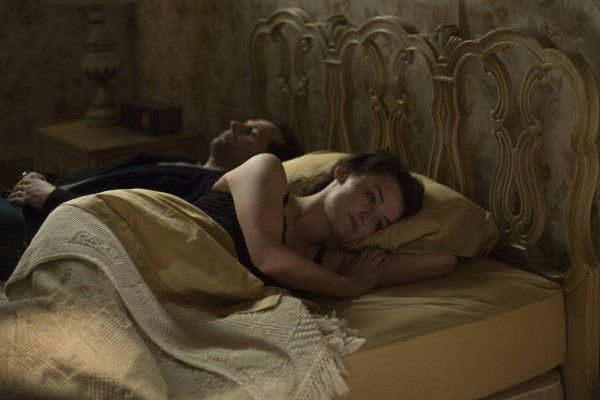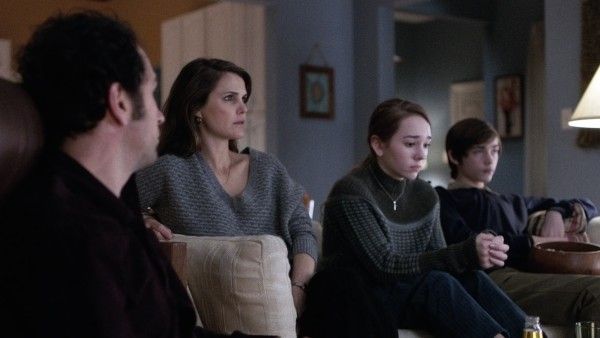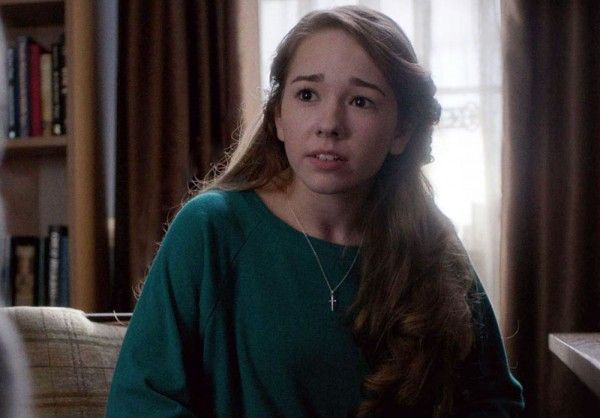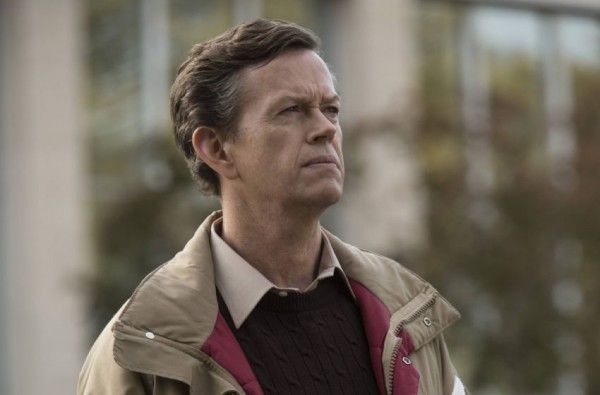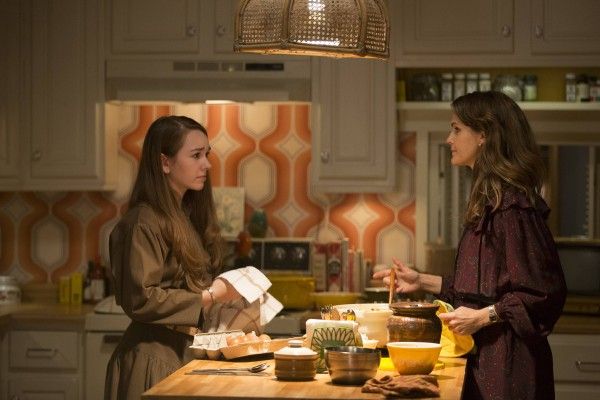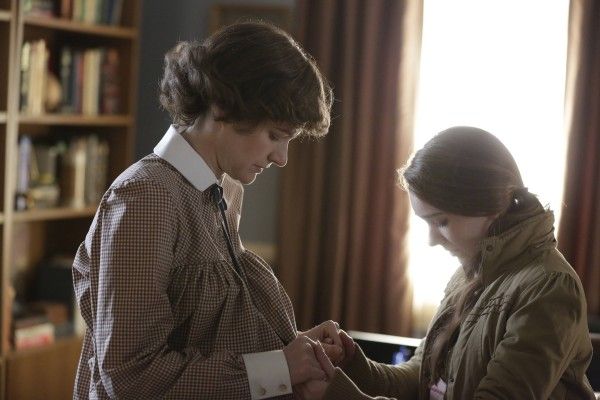One of the most celebrated aspects of The Americans, FX's consistently enthralling and ingenious spy drama, is its attention to detail. Those of you who have seen X-Men: Apocalypse will know how easy it is to oversaturate with period nods, but The Americans has always focused on smaller flecks of reflective pop culture, things that people who actually grew up in the 1980s remember doing with their family, or in their home alone. In this season alone, David Copperfield making the Statue of Liberty disappear seemed to suggest the perilous ease in which symbols of America and freedom can evaporate, but also hinted at an uncommon intimacy in the land of spy-work, with the Jennings family watching in astonishment in their living room.
In "Persona Non Grata," the superb Season 4 finale of the series, Super Bowl XVIII -- which saw the Washington Redskins face off against the Los Angeles Raiders -- becomes the final reflective vision of the conflicts that have powered each episode of this season. What we see on the television is the fallout of a tremendous defeat, the Redskins and Raiders' players assessing what happened on the field, and its connection to what happens to William Crandell, played by the invaluable, endearing Dylan Baker, in the episode is pretty obvious. It's just as important, however, to look at how the game and the after-game interviews are being seen, by Henry (Keidrich Sellati) alone at home and Paige (Holly Taylor) with her would-be boyfriend, Matthew (Danny Flaherty), son of Stan Beeman, the neighbor of the Jennings and FBI lead agent played by the great Noah Emmerich.
The family has been disassembled, largely due to the strains put on Philip (Matthew Rhys) and Elizabeth (Keri Russell) following their continued operations in the U.S.A. Those very operations had been of a particularly high order throughout the fourth season, with Crandell handing off deadly diseases to his comrades, and hit a thrilling climax early on into "Persona Non Grata." Director Chris Long, who also serves as an executive producer, has proven especially daring and attentive in his image-making in this season, but he has never been as sharp as he is in the season finale. Even before the credits hit, he patiently drawing out the tension of Crandell's final drop-off and Stan's stalking of his prey, alongside his partner, Dennis Alderhot (Brandon J. Dirden), only to then extend the suspense further into the episode's runtime, even beyond when Crandell sticks himself with the dose of the disease to avoid Stan's team gaining control of it.
Long's direction seethed with cinematic precision, a type of cold, imposing 1980s style that intermittently recalls major filmmakers that came into prominence in the era, from De Palma and Carpenter to Cronenberg and Wenders. The opening confluence boasted a use of light -- the red brake signal permanently backlighting Stan and Dennis, the yellow-green the covers Philip on his ride to meet Crandell -- that made me think of Wenders' classic The American Friend. But even more staggering was the Cronenbergian architecture and distancing that powered the scenes where Dennis and Stan look after an increasingly failing Crandell. The vision of the two agents, perched high and sectioned off from the ailing man, is a perfect, devastating encapsulation of how Reagan, and his opponents in the Cold War, put themselves apart from the deaths they caused in their, er, disputes. I thought of the confessional theater that's featured heavily in The Brood, Cronenberg's therapeutic nightmare, in how the therapy was a kind of performance for others, and the end of a sort of polite interrogation. Even with these similarities, the episode didn't feel derivative in any way, each decision of visual style corresponding to something unique in the narrative.
There is no way to overstate the importance and the unlikely, profound grace exuded by Baker in his final scenes. In an episode that featured more than a few roaring speeches, and memorable, cutting lines -- "You have no idea!" That one really stung. -- Baker's final thoughts on his existence leave major marks. When he speaks about "the absence of closeness," he says something deeply troubling about the nature of distrust: the ache of knowing that you are regarded as nothing more than a utility. There were similar notes in Philip's speech at EST, where he talked about being held down by the whims of people "you don't give a shit about." And yet, he cannot quit, in fear of letting down people that he loves. Crandall expresses a similar desperation, a need to be of use to the cause and the country, even when you grow to hate the sacrifices you've made for them. Baker summons a pickled but especially disappointed disposition, and the fondness he expresses for the Jennings and the regret he shows for a lost love hit distinctly hard.
"Persona Non Grata" doesn't answer every question. One could argue that there was something more to be settled with Philip's severed relationship with Martha (Alison Wright), who we think is in the Soviet Union but have no real way of knowing. There also might have been something more with Elizabeth's diluted friendship with Young Hee Seong (Ruthie Ann Miles), after her husband, Don (Rob Yang) was used and discarded for information and money. Maybe matters had to be settled with Pastor Tim (Kelly AuCoin). I would have liked more of everything this season, frankly, but what they decide to tend to instead is really quite remarkable. The way Arkady (Lev Gorn) looks at his bust of Lenin, as Leonard Cohen's "Who By Fire" lights up on the soundtrack, or how Costa Ronin's Oleg said goodbye Tatiana (Verna Cherney) attests to the constantly alert sense of the history and personal commitment that went into this kind of action and behavior from heads of state. It's in the way that the series can make both Arkady and Tatiana's use of the term "a good son" mean so many things, from Oleg's childish charms to Tatiana forcing herself to see him as just a colleague.
The Soviet characters are as sharply drawn as the Jennings', or the Beemans, and our familiarity with a character like Arkady pays off in these seemingly final sequences, especially when he meets with Peter Jacobson's Agent Wolfe to discuss Crandall's capture and the death of former director Gaad (Richard Thomas). The decor and the tone of Wolfe and Arkady's meeting is convincing, but the performers' deliveries and physicality come into play here and render the scene vividly human. And the lustful relationship between Oleg and Tatiana has proven to be a far more involving relationship than originally thought, and his final words to her have a sting, a feeling of another, perhaps happier future being abandoned for something safer.
Even the inclusion of Philip's Russian son felt apt as a way of magnifying the idea of Philip's search for himself outside of his job. But what's most haunting about Philip in this episode is his own distrust, his own fury at anything that ruptures the security of his family. When he ends the episode telling Paige to stay away from Matthew, a relationship that creator Joe Weisberg and his writers have taken great care and sensitivity into crafting, it's clear that his parental concern is mixed with an anxiety: What if they can use my daughter to turn the son of an FBI agent? It certainly wouldn't be the ugliest or most deceitful thing his overlords have required of Philip or Elizabeth, or Gabriel (Frank Langella), their trusted handler, for that matter. Philip is as sick with his life as Crandell quite literally is, and one could see Baker's character as an expressive vision of Philip without his family, the comrade who never quit.
Cutting between the long-stewing rebellions of each man, "Persona Non Grata" represents a walloping vision of the fury that being forced away from your own identity can materialize, how war, political deal-making, and national security can at once cause an anger that can easily turn to bitterness and disloyalty, or simply give the kind of regret and grief that eat away at you like a plague. Running back home seems like the only option for Philip's frustrated existence, and for Elizabeth's newfound misgivings about her job, but I can't stop thinking of the fear and the stubbornness that Philip shows in the EST meeting, the sickened way he simply says that "I can't" leave my job. His nationalism is strong, deep-rooted in his persona, but loyalty to a cause, to a homeland, only grows black and putrid if you're not allowed to follow your own desires and passions as well. And that's as true in the erstwhile Soviet Union as it is in the United States of America.


